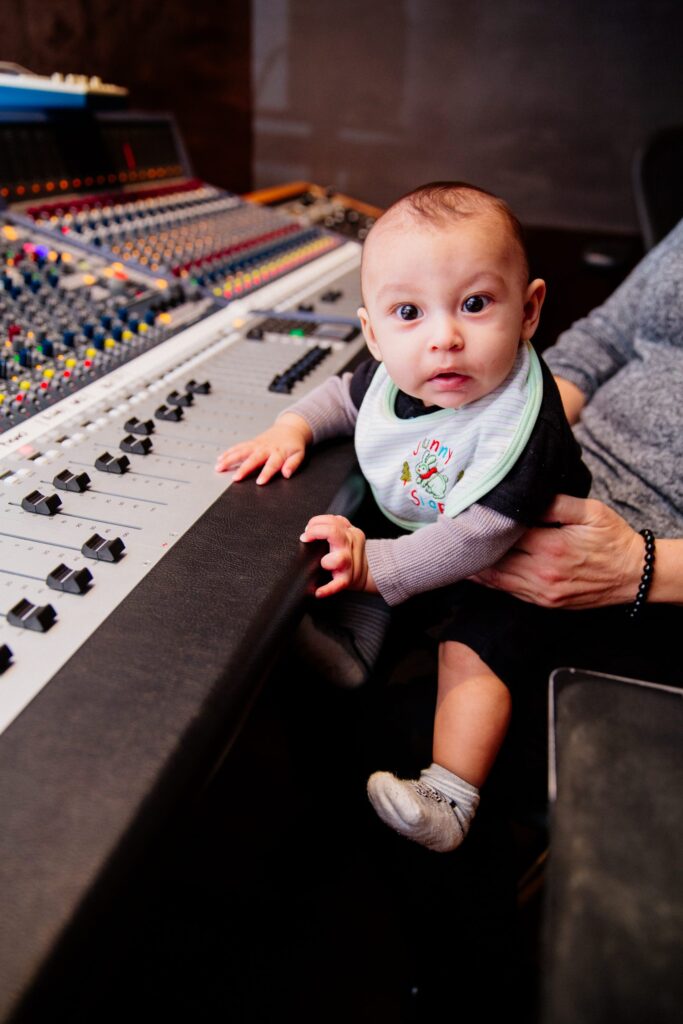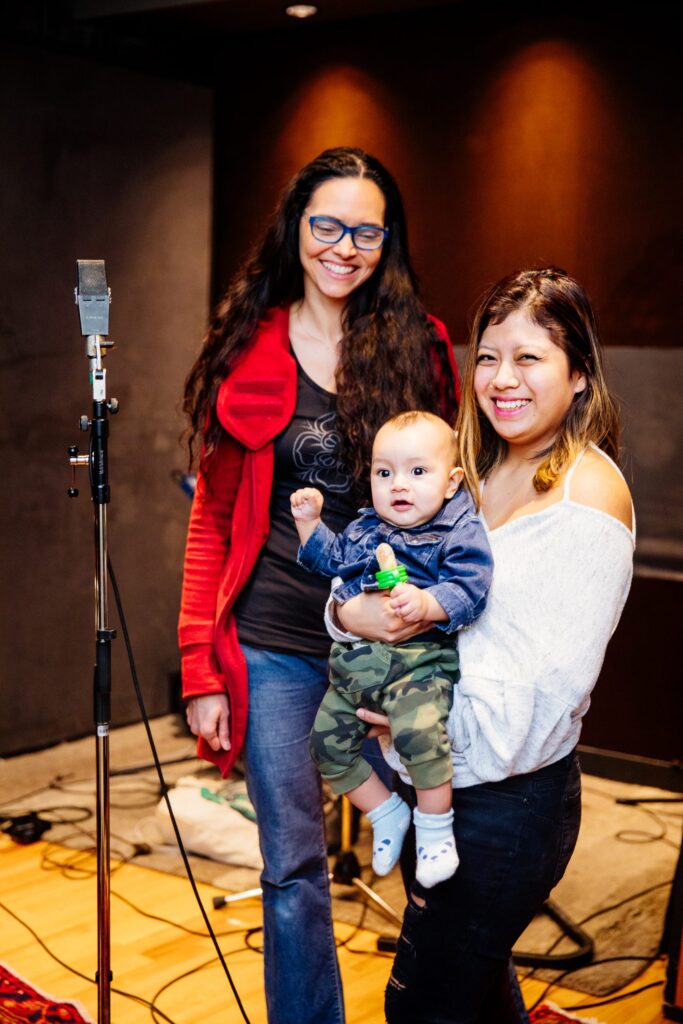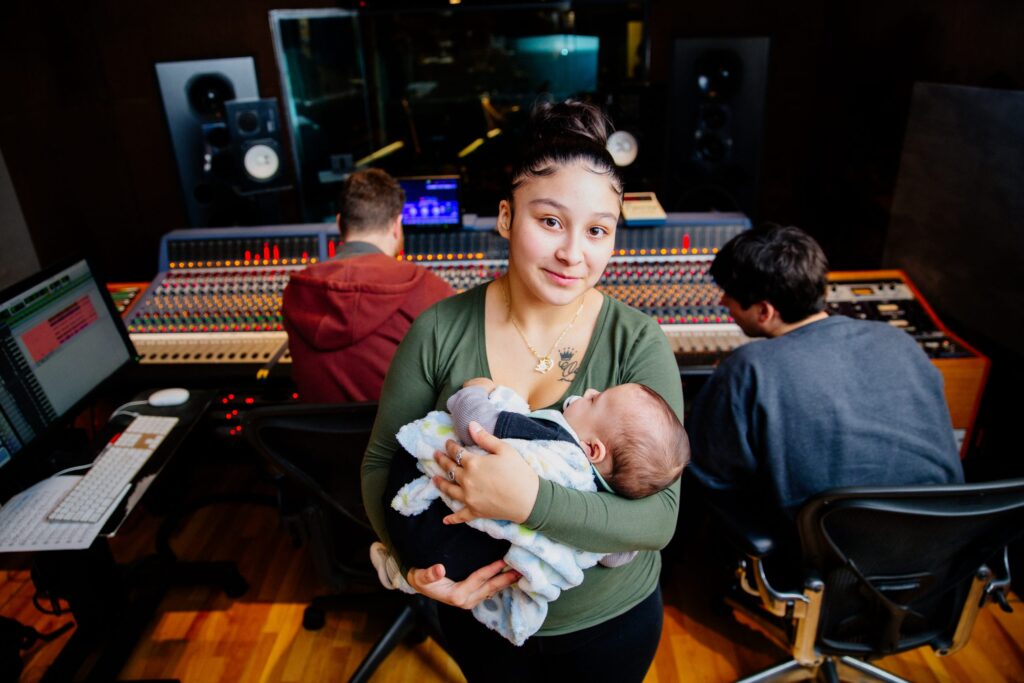PHOTO GALLERY BELOW
Often newborns get a blanket or a stuffed animal as a welcome gift to the world. The Lullaby Project enables parents to give their child a song – inspired by them. The project teams new and expectant parents — recommended by community partners — with professional songwriters, who write, record, and perform an original lullaby for their baby.
The unique creative experience originated at Carnegie Hall’s Weill Music Institute, the esteemed New York venue’s education and social impact program. It has since expanded to more than 30 other organizations, including Toronto’s The Corporation of Massey Hall and Roy Thomson Hall (MH-RTH), where 58 parents have participated, producing 58 songs to date.
“We signed up as a partner in 2017,” says Vanessa Smith, MH-RTH’s Director of Education & Outreach. “Every program is run independently, funded independently, has a different structure, because you need to fulfill the needs of your own community, and not run off a boilerplate. Carnegie also offers a few educational webinars, and an annual conference where people can share how their programs work. Our version is run by our Education Department.”
Before COVID, all the songwriting sessions were in-person. “When COVID happened, of course we moved everything online,” says Smith, “and we’ve actually found that for most circumstances, it’s a really convenient way for parents who are juggling a million different things to be able to meet with that songwriter.”
Smith says the project is ongoing, amounting to about 10 to 15 participants annually. The songwriters, musicians, engineers, and staff involved in the project are all paid. For the new or expectant parents, it’s free.
Participating songwriters, to date, have included Justin Rutledge, Shawnee Kish, Ammoye, Eliana Cuevas, Murray Foster, Angela Saini, Peter Katz, Kate DuTemple, Lis Soderberg, Liz Lokre (LOKRE), Cathy Nosaty, Nefe Felker, Scarlett Flynn, Tasneem Nanji, Orit Shimoni, Nicole Chambers, Ramy Zhang, Carlie Howell, and Phoenix Pagliacci.
“We have a form that we ask everyone to fill out so we can learn more about them, who they are, why they’re interested in this program, and the genres they work in,” says Smith of the songwriters. “Because we make these matches personally, we learn as much about the participant as possible, and make a match based on personality, or demographics, or language – things that are going to make a really successful partnership.” (Interested songwriters can request the application form at education@mh-rth.com.)
MH-RTH’s The Lullaby Project first partnered only with Jessie’s —The June Callwood Centre for Young Women, a drop-in spot for pregnant and parenting individuals under the age of 21. But it expanded after COVID to include the Regent Park Community Health Centre; Birth Mark, which provides free doula services for pregnant individuals from vulnerable populations; and The Krembil Brain Institute at the University Health Network (UHN), where neurologist Dr. Esther Bui is studying the effect of The Lullaby Project on pregnant individuals with epilepsy.
“We had started discussions with Dr. Bui in 2019, but we didn’t write our first lullabies with her patients until the Spring of 2021,” says Smith. “We also wrote our first lullaby with Regent Park Community Health Centre then, and started working with Birth Mark at the same time.”
No musical experience or talent is needed for the parent, or parent-to-be. “We’ve had people who are, like, ‘I’m so terrified of this, I have no idea what’s gonna happen’,” says Smith. “And we’ve had people come in and be, like, ‘I already have half a song, and I want to play my guitar in the recording.’ It’s been all different levels, over about six years.”
The songwriters, however, do get online training before the project starts, to get guidance on collaborative songwriting, so that they get the parent to tell a story, or come up with a melody.
“We’ll work with people who’ve been involved with this project for us for a number of years, to talk about how to connect directly with that parent, and how you can work together to take the story that they tell, and use your own method – because everyone has a different way of songwriting,” says Smith. “So, [you figure out] how to work together to form that safe space, and form that bond, and sense of trust, and then adapt your songwriting methods.”
The parental participants, suggested by the four partners, work with their songwriting partner for about an hour to 90 minutes on Zoom, about five or six times, over the course of about eight weeks, to create the final song. “After that, there’s a bit of a break, where the artist can go away and work with it, maybe make a demo, maybe make some lyric sheets,” says Smith. “We’ll meet again to go over it once before recording, and then we can go into a recording studio and record the actual song.”
The Lullaby Project had been cutting the songs at Revolution Recording, but recently used the newly-completed Deane Cameron Recording Studio at MH-RTH’s Allied Music Centre. “It’s really cool to be able to connect the participants to Allied and Massey Hall and be a part of that whole experience,” says Smith. “It’s a beautiful space.”
In September of 2023, the TD Music Hall, also at the Allied Music Centre, hosted a Lullaby Project concert, which featured 12 lullabies performed live for the first time by the parents and artists who wrote them, accompanied by a house band and guest musicians (watch here after signing up for a free MH-RTH account).
Smith says the annual concert will help mark the completion of each The Lullaby Project season. They held two concerts the first year, in 2017, then one in spring of 2019, then stopped when COVID shut down the live industry. “The plan is that we’ll do another one this Spring [of 2024]” says Smith. “We don’t have a date yet. And then, from now on, we’ll be doing them every May to celebrate what happens that season.”
In a first, Paola and Nosaty’s collaboration, “Te Amo,” was recorded by Amanda Martinez for her album Libre. The option is also there if the parent doesn’t want to have the lullaby performed in public.
“We put [the option] on our intake forms, because it can be a very personal and vulnerable experience,” says Smith. “You’ll find, if you listen to some of the past songs, there’s some really personal stuff that comes up during this process. So [not sharing in public] is a possibility, but it’s not one that many people have taken us up on. A lot of people really enjoy the opportunity to share their story and share their experience.”
- Photo : Jennifer Rowsom
- Photo by : Jennifer Rowsom
- Photo by : Jennifer Rowsom


